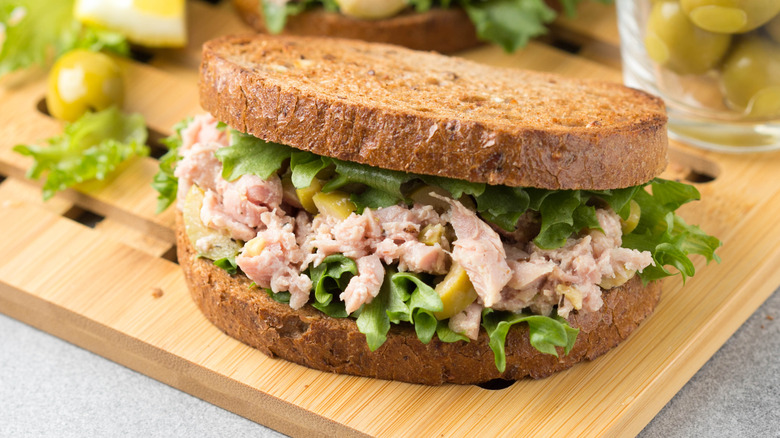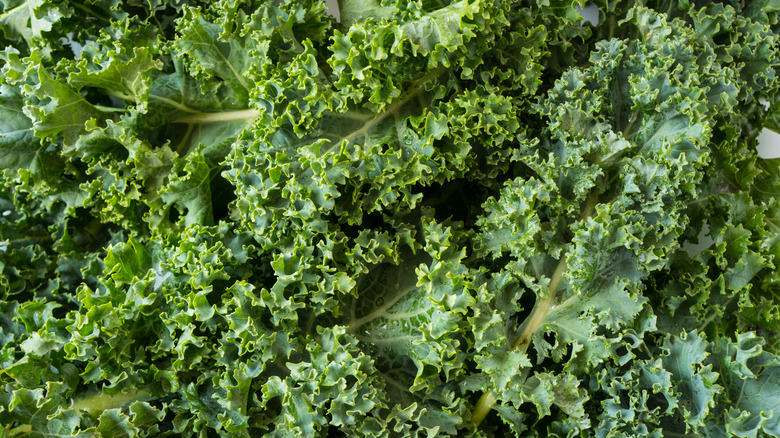What Happens To Your Body When You Eat The Same Thing Every Day
Okay, let's be honest. How many times have you fallen back on a go-to meal (it can be either home-cooked or takeout, we're not judging here) at the end of a long, hard day? If you're like us, this happens a lot, and we're glad to hear that we're not alone in that. "It's so easy to fall into food ruts," states New York-based nutritionist and chef, and founder of AM/PM, Marissa Lippert, to Real Simple. "If you're exhausted or bored with food, you often end up reaching for the same thing out of convenience because you're too tired to make yet another decision that day."
But now and again, it's important to stop, step back, and take stock of the effect on your body when you eat the same food day in, day out. While repeating meals or snacks can be easy and often comforting, it can also lead to a lack of variety in your diet. According to registered dietitian nutritionist Christine Palumbo, this can be problematic, as variety is vital "if your goal is to get or stay healthy" (via Well+Good). But how exactly does a lack of variation in your diet get in the way of health? And is duplicating your daily diet always a bad thing? Join us as we get into the pros and cons of eating the same thing every day.
You might end up losing weight
While eating the same thing every day might not be the most obvious path to losing weight, it turns out that a repetitive diet can end up in ultimately end in weight loss, according to Chelsey Amer, a registered dietitian nutritionist (via NBC News). Amer states that eating the same foods over and over ends up in less energy being consumed overall, "due to 'food habituation'," a process by which you get used to the food you're eating and end up decreasing the amount you consume overall (via Ohio State University). And when you're eating a much more varied diet, Amer says that "you may (inadvertently) delay feelings of fullness or satisfaction from your meal and increase the amount of food you eat," to sample the wider and more novel range of food on offer.
Amer's assertions about how keeping a narrow diet can result in lower body weight has also been supported in scientific research, such as a study published in Psychological Bulletin. The research examined the link between food variety and weight gain and found that a larger diversity of diet can, over time, contribute to weight gain and even obesity.
Your body might be exposed to contaminants
If you're fixing a tuna sandwich for the fifth time this week, you might want to think about changing things around a little. That's because repeating certain foods can inadvertently expose your body to stuff you might, upon further examination, really wish to avoid. "There are situations where eating a very low variety diet might expose you to higher levels of certain environmental contaminants," advises Monica Reinagel, licensed nutritionist and author, to Eat This, Not That! These contaminants can either work their way into your food through pollutants or through naturally occurring toxins in the environment, according to research published in Frontiers in Pharmacology.
In addition, these contaminants can be present in food that's typically deemed to be a healthier option, which can be pretty surprising if you're trying to eat healthily. Canned tuna, for example, which is much-favored for its healthy omega-3 fatty acids, can also contain mercury. Levels found in some canned tuna can be harmful to children and adults in larger doses, states Prevention. And brown rice, the fiber-filled alternative to white rice, can carry higher levels of arsenic than other grains. That arsenic is typically absorbed through the soil and water used to grow the rice crop.
With any food that carries a risk of contamination, it's important to make sure you're eating alternatives regularly. So, try swapping out your brown rice for quinoa or farro on occasion, as registered dietitian Jessica Cording recommends to Prevention.
Your gut health might suffer
Your gut loves good food, and it loves a wide variety of the stuff. And unfortunately, if you're sticking to the same old meals every single day, your gut's health can pay the price. Your normally diverse microbiome, which is essential for a healthy immune system and the proper breakdown of food (per Harvard Health Publishing), can become a little less well-populated. This was found in an observational study published in Nature, which looked at the effect of monotonous diets on gut microbiota in elderly populations. The study found that when a more monotonous diet was present in the people observed, their microbiome became less diverse overall.
Given that gut bacteria is pretty vital for maintaining good health, keeping your microbiome diverse and balanced is pretty crucial. As well as eating a diverse range of foods to supply your diet with a wealth of nutrients, making sure you consume plenty of fruits, vegetables, and beans is also a great idea, says Healthline. Fermented foods, like yogurt, sauerkraut, and kimchi can also supply your gut with good bacteria like different varieties of lactobacillus. This bacterial strain can act as a probiotic that bolsters your health and helps to break down food into more easily-absorbed nutrients.
You could have less energy
Have you started to feel like your regular daily lunch just isn't getting you through the afternoon like it used to? Turns out, there's a very solid reason for that. Consuming the same food every day can actually result in less energy over time. This is down to the occurrence of 'food habituation,' the acclimatizing of the body to eating the same food, again and again, which can lead to you eating less overall, as found by a study published in the American Journal of Clinical Nutrition. And if you're eating less, and therefore taking on less energy? Well, that simply means that you have less energy to burn.
The solution? If you're finding you're lacking in energy, then try to mix up your diet. As Harvard Health Publishing notes, eating a varied and balanced diet with a range of healthy carbohydrates, fats, and proteins should help to keep your body well-stocked on different nutrients and energy sources. It's also advisable to veer towards foods that will give you sustained energy, like the complex carbohydrates found in whole grains, beans, and oats (via Healthline) or iron-rich foods. Meanwhile, you should steer away from those that give you a quick boost and then a subsequent crash, like simple carbs.
It might help to reduce your stress levels
Sometimes, the world gets to be a little too much. Experiencing some level of stress is understandable and oftentimes inevitable. In those weeks where you feel like you're making every decision under the sun, taking the pressure off when it comes to mealtime and going with what you know can help to minimize your stress. "Eating the same thing every day will definitely take the guesswork out of choosing a meal, and it provides a routine," states registered dietitian Kate McGowan to NBC News.
By removing this guesswork, we can avoid overloading our brains with choices and experiencing the dreaded decision fatigue. Psychotherapist Kyle MacDonald states that this can be a huge drain in a psychological sense, contributing to stress and apathy. It can also affect our food choices for the worse (via Healthy Food). To help avoid this, or to pull back on decisions if you feel you're experiencing decision fatigue, MacDonald recommends trying to plan ahead for meals. Additionally, signing up for a meal box delivery service can be a great way to make sure you're getting an interesting and varied diet without having to drag yourself to the grocery store after work on a regular basis.
It could limit your body's access to varied nutrition
So you've read an article about blueberries and now your fridge is full of them. No judgment, we've all been there. And blueberries can be pretty tasty and good for you. But it's important to recognize that eating a food every day, regardless of how healthy it is, might not be a super healthy decision in the long term. Nutritionist Auslander Moreno explains this to The Healthy, stating that while many people "hyper-focus" on particularly buzz-worthy foods, "assigning yourself to a confined list of foods because they are the most well-known or well-described will box you in and close you off from various other vital nutrients." In other words, variety really is the spice of life — and your diet.
But, while Moreno makes a good point, it's also important to remember that a diet that incorporates a range of these foods, even if you're eating them every day, can still be super-nutritious. It's also true that we can sometimes become too focused on getting the most varied diet out there. "If your daily lunch contains a variety of healthful foods, relax and enjoy it," NYU professor of nutrition and food studies Marion Nestle says to The Atlantic. A salad full of a range of vegetables, grains, and healthy proteins will still be good for you if you consume it daily. It's just that eating only one healthy thing probably isn't the answer.
It could increase your risk of metabolic syndrome
What we eat can have an enormous impact on our health, and sometimes what we don't eat can do the same. If your diet is a little same-old, same-old, it could lead to an increased risk of certain health concerns. This includes metabolic syndrome, a group of conditions that can occur simultaneously that, together, raise your likelihood of chronic and dangerous conditions like heart disease or type 2 diabetes (via Mayo Clinic). According to a study published in The Journal of Nutrition, individuals who had a more varied diet had a lower risk of developing metabolic syndrome. Meanwhile, those with more monotonous diets had a higher chance of experiencing the syndrome.
As metabolic syndrome is identified by the presence of a group of conditions, if you suspect you're experiencing more than one of the factors (which include high blood pressure, elevated blood sugar, elevated cholesterol levels, and a larger waist circumference), it might be useful to speak with your doctor. Consuming a varied diet with lots of fruits, vegetables, whole grains, and healthy proteins, while also trying to limit your intake of salt and saturated fats, can help prevent metabolic syndrome.
You could be getting too much of one food
As the old saying goes, you can have too much of a good thing — and that's as true when it comes to your diet as anything else in life. Overloading your meals with one ingredient can mean that you create a dietary imbalance. Take turmeric, for instance. While the spice has recently come into the spotlight for its antioxidant properties and potential to help digestion and reduce inflammation (per Everyday Health), you can still overdo it. Consuming too much turmeric could interfere with iron absorption, lower your blood sugar to concerning levels, or contribute to the formation of kidney stones due to its high oxalate content.
Kale is another food that you can get a bit too much of, despite its healthy reputation. "Kale is awesome, but definitely switch up your greens," recommends registered dietitian Lauren Manganiello to Women's Health. One of the reasons for this is because of kale's high fiber content. While this is generally a good thing, according to Manganiello too much of it "can fill you up quickly and crowd out other good, nutrient-dense foods from your diet." Being full of fiber and little else isn't doing your system too many favors.
You could have a shorter life
Eating the same thing every day could help you find more time in your schedule, sure. But when it comes to your overall lifespan, things might not seem so rosy. According to a study published in the International Journal of Epidemiology that looked at the link between dietary variety and mortality in women, participants who followed a healthy and diverse diet had a much lower rate of mortality than those who ate a more boring menu.
It's important to point out that this study, which used data from over 59,000 women, indicated that the increase of the number of healthy foods eaten seemed to affect mortality, as opposed to eating fewer types of less healthy food. The study's authors explicitly pointed out that having a less healthy diet (defined by the presence of red meats, saturated and trans fats, and refined carbs) "was not directly associated with a higher overall mortality." In short, mixing up your diet is potentially the way forward to a longer life.
Your immune system could get weaker
When you eat the same thing day in, day out, you can naturally end up limiting the number of foods you're not eating. And by constructing a less diverse diet, you can end up becoming deficient in certain nutrients. This deficiency can lead to a reduction in your immune system's effectiveness. The British Journal of Nutrition notes that eating only specific foods can result in noticeable immune impairment. All told, consuming too much of a certain food or nutrient can also potentially cause impaired immune function.
For this reason, it's advisable to follow a diet that doesn't fall prey to the most common immune deficiencies. Two of the most vital nutrients our body needs, iron and vitamin D, are vital to a healthy immune system. They can also often be lacking in a diet, according to Healthline. Not getting enough vitamin A (from dietary sources like sweet potatoes, carrots, fish liver oil, and dark, leafy greens) can also result in weakened immunity.
Eating the same foods could hinder weight loss
While some evidence points towards a more limited diet leading to greater weight loss, it's also been observed that the opposite may well be true. Eating the same food repetitively can sometimes cause you to lose less weight. This is especially apparent over a longer period, as the Journal of Nutrition shows. The study in question looked at the body weight and fat levels of participants who were eating a greater variety of healthy foods, with a specific focus on the amount of weight lost after six months and two years. The authors found that at both the six-month mark and the two-year mark, waist circumference and body fat were reduced for those following a more varied diet.
The important distinction here is that the study focused on diversifying a diet with more healthy foods. Making your diet more varied with less nutritious things like ultra-processed foods can result in weight gain instead, as a large-scale study published in Clinical Nutrition found. So if you're craving a little more variety in your diet, try to make sure that the foods you're incorporating veer towards the healthier side of the spectrum, like whole grains, heart-healthy fats, and lean protein.
You could increase your risk of food intolerances
The body is a highly adaptable thing, and this is especially true with how it reacts to what we eat. Unfortunately, sometimes our body can react to our diet in ways that we don't want, particularly when we eat certain foods again and again and avoid others. "When you eat a large quantity of the same food over a long period of time, then your microbiome changes," states registered dietitian nutritionist Kimberly Jacobson to Eat This, Not That! As your microbiome adapts to your diet, it can end up making less of specific enzymes that are used to break down food that it's seeing less of, as Emily Servante, an Ultimate Performance certified personal trainer, says (via Eat This, Not That!).
This can end up increasing sensitivity and the risk of intolerance to food that you might be excluding from your diet in favor of a repeated, familiar meal. It also means that, when you end up eating the food that you've been avoiding, "you may experience discomfort that you would otherwise not have had," says Servante. Symptoms of food intolerance can be stomach pain, bloating, gas, stomach cramping, nausea, or even vomiting and diarrhea (via Cleveland Clinic).
Your sleep quality might decrease
We can sometimes forget how much our diet affects our sleep (although anyone who's experienced the agony of trying to get some shut-eye after late-night coffee might be all too aware. But what we eat and drink on a day-to-day basis can have a huge effect on our sleep length and quality, per the Sleep Foundation. When you eat a monotonous and limited diet, your sleep quality can be negatively affected. This is according to a review of studies published in Advances in Nutrition which looked at the link between diet and sleep quality specifically. The review found that evidence points towards poorer sleep quality and length in individuals who ate a smaller variety of foods. Authors cited one study, in particular, which observed that those who sleep less than 7 hours per night generally consume fewer proteins, carbohydrates, vitamins, and minerals than those with a longer average sleep span.
If you're experiencing poorer sleep quality and think your diet could be a factor, it could be due to the specific vitamins and minerals you're consuming (or not getting enough of). A study published in Nutrients found that adults who experienced poor sleep often had inadequate intake of vitamins A, C, D, E, and K, as well as lower levels of calcium and magnesium.














